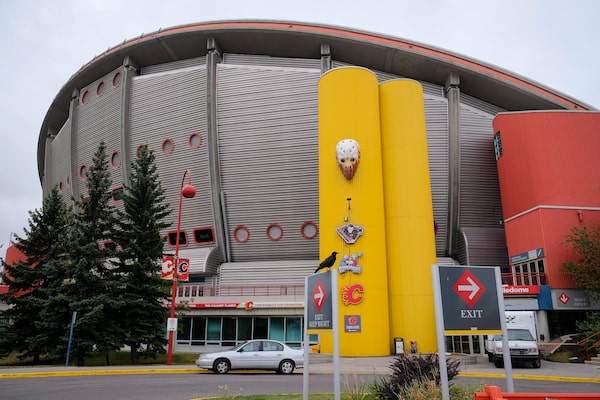
The new arena would be only a few hundred metres from the nearly 36-year-old Saddledome, pictured above.Jeff McIntosh/The Canadian Press
Calgarians have less than a week to consider a plan to spend $275-million on a new hockey arena before council votes on the deal, but economists say the numbers don’t add up and the details are thin.
The Calgary Flames could get a new $550-million home under a plan unveiled on Monday evening that would leave the city’s taxpayers on the hook for half the price of the new arena, however, the plan comes as the city is in the midst of budget cutting. Council will vote to approve the plan next Monday and officials say all unallocated money in the municipal budget will need to go to the arena project to avoid tax hikes.
The price tag being presented to the public doesn’t include all the costs that will fall on municipal taxpayers, according to University of Calgary economist Trevor Tombe. Along with an option in the deal that is not allocated for and would allow the owners of the Calgary Flames to buy premium land adjoining the planned arena at a bargain rate, he said the city’s projected return of $400-million on the project is a “misleading” figure to present to the public.
“It distorts our vision by making it seem like this is a project that comes without cost, but it does,” he said.
Instead of earning $400-million over 35 years, as the city has argued, he said the project’s real cost to the city in present terms would be a loss of $47-million. “That strikes me as a number that isn’t that big. They could make a case for this project for a city of this size,” Dr. Tombe said.
If the city were to fund its share of the project through higher taxes, the arena project would require every homeowner in the city to pay $2 more in monthly taxes forever, he said.
The plan, negotiated over 14 months by the city and the owners of the Flames, calls for a 19,000-seat arena to be built on a parking lot currently used during the summer months by the Calgary Stampede. Construction is not expected to start before 2021 at the site, which lies east of downtown, and would last about three years.
The new arena would be only a few hundred metres from the nearly 36-year-old Saddledome. The saddle-shaped arena is the third oldest in the National Hockey League and the team has made rumblings in the past that it would consider moving unless the city built a modern replacement. The new arena, which would be owned by the city and wouldn’t incur property taxes, would also require the Flames to commit to staying in Calgary for the next 35 years.
Hours after council debated the area deal for the first time in public on Monday evening, councillors met again on Tuesday to discuss how to cut $60-million from spending because of a continuing budget crunch. The fire service, police department and transit system are facing millions in cuts each.
“This is on the same day they are bringing $60-million worth of cuts. We’re going to have fewer police officers, fewer fire fighters and fewer transit operators, but we’re still going to have our hockey players. The optics are crap,” said Stephen Carter, a political consultant who was part of the campaign for the 2026 Winter Olympics. Residents rejected that bid in a November plebiscite after months of public consultation and debate.
A motion in front of council on Monday to extend public consultation on the arena deal to September, after other budget debates are finished, was defeated. The public should be given more time to look at the deal and comment, said Lindsay Tedds, an associate professor of economics at the University of Calgary. Public comment is currently only open until Friday at noon.
“Citizens of Calgary are only being given four days to provide comment on a fairly complex deal, the details of which city staff do not seem to be able to themselves be able to appropriately develop and release for consideration. The sole rationalization for this timeline is to ‘capitalize on momentum,’ which seems like very weak rationalization,” she said. A number of councillors have said that the short consultation will allow the deal’s “momentum” to continue.
Editor’s note: (July 23) In an earlier version of article, it was stated that Lindsay Tedds is an assistant professor. In fact, she is an associate professor.
We have a weekly Western Canada newsletter written by our B.C. and Alberta bureau chiefs, providing a comprehensive package of the news you need to know about the region and its place in the issues facing Canada. Sign up today.